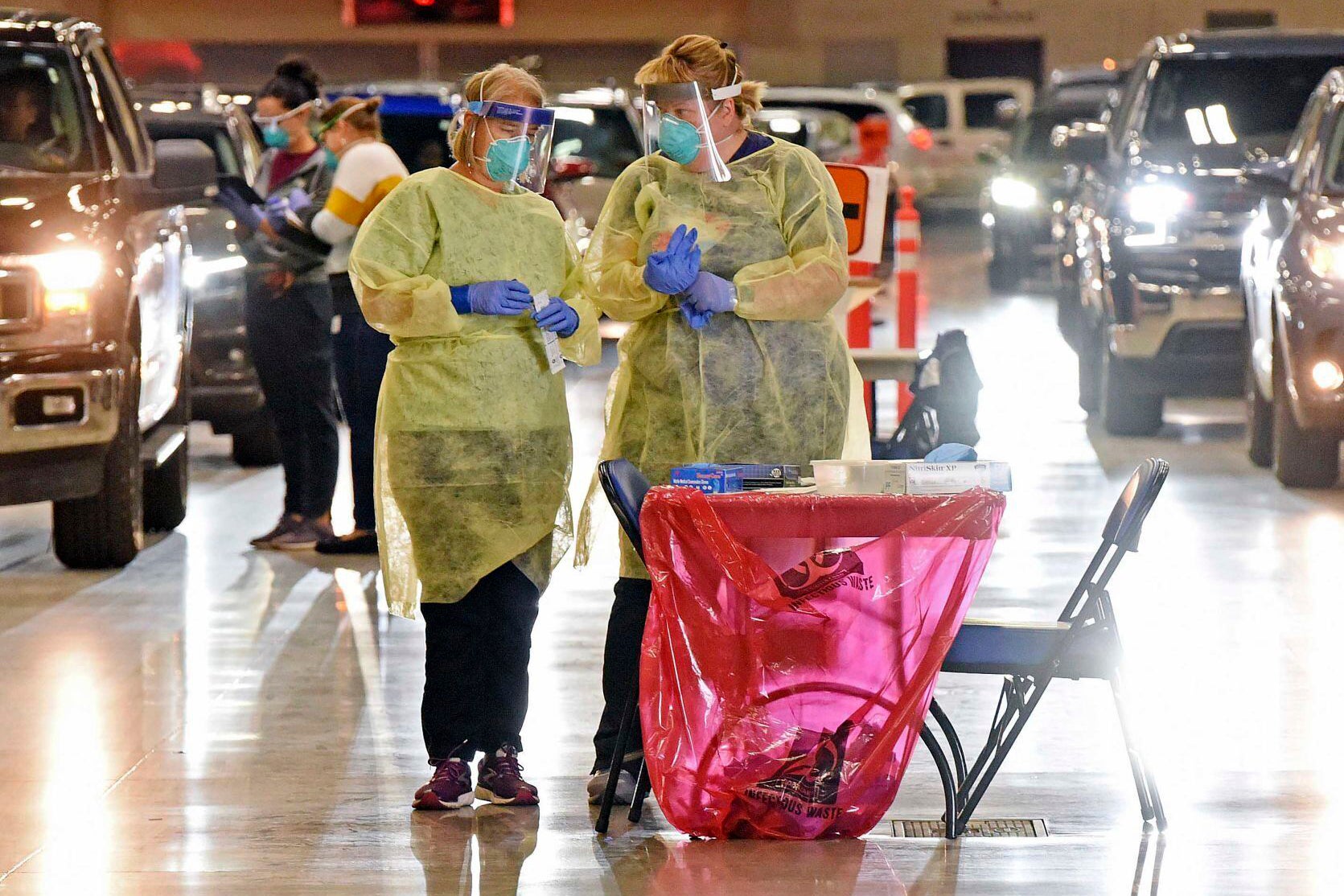Hospitals feel squeeze as coronavirus spikes in Midwest
The coronavirus has tightened its grip on the Midwest, with hospitals in Wisconsin and North Dakota running low on space

Your support helps us to tell the story
From reproductive rights to climate change to Big Tech, The Independent is on the ground when the story is developing. Whether it's investigating the financials of Elon Musk's pro-Trump PAC or producing our latest documentary, 'The A Word', which shines a light on the American women fighting for reproductive rights, we know how important it is to parse out the facts from the messaging.
At such a critical moment in US history, we need reporters on the ground. Your donation allows us to keep sending journalists to speak to both sides of the story.
The Independent is trusted by Americans across the entire political spectrum. And unlike many other quality news outlets, we choose not to lock Americans out of our reporting and analysis with paywalls. We believe quality journalism should be available to everyone, paid for by those who can afford it.
Your support makes all the difference.The coronavirus tightened its grip on the American heartland, with hospitals in Wisconsin and North Dakota running low on space, and the NFL postponing a game over an outbreak that's hit the Tennessee Titans football team.
Like other states, health officials in Wisconsin had warned since the pandemic began that COVID-19 patients could overwhelm hospitals. That's now happening for some facilities as experts fear a second wave of infections in the U.S.
A record number of people diagnosed with COVID-19 were hospitalized in Wisconsin. Of those 646 patients Tuesday, 205 were in intensive care, with spikes in cases in northern parts of the state driving up the numbers.
Officials at ThedaCare, a community health system of seven hospitals, said they have exceeded capacity in the COVID-19 unit at their medical center in Appleton, about 100 miles (160 kilometers) north of Milwaukee. It's started sending patients to other hospitals about 40 miles (64 kilometers) away.
In North Dakota, hospitals are adding extra space amid concerns from employees about capacity. Nearly 678 COVID-19 infections per 100,000 people have been diagnosed over the past two weeks, leading the country for new cases per capita, according to the COVID Tracking Project.
A new hospital unit opened in the capital of Bismarck to add 14 more beds, with nearly half of those for intensive care patients. The space isn't exclusively for coronavirus patients but could be used to treat them if needed.
A total of 21,401 people in North Dakota have tested positive since the start of the pandemic and 105 are now hospitalized.
The strain of the virus in the Midwest comes as President Donald Trump and his Democratic rival, Joe Biden, sparred over the pandemic during the first presidential debate. Trump defended his handling of the virus, saying he has struck the right balance between preserving the economy and pushing for a vaccine. Biden criticized Trump for doing too little, too late and putting Americans' lives at risk by being slow to encourage the use of masks and social distancing.
Meanwhile, the NFL decided to postpone the game between the Pittsburgh Steelers and the Tennessee Titans after three Titans and five other team personnel tested positive for COVID-19. The Titans have closed their facility through at least Friday and will not be able to practice together until Saturday at the earliest.
On Sunday, Tennessee beat the Minnesota Vikings, which have closed their team facility through at least Wednesday.
Soon after the NFL’s announcement Wednesday, Titans coach Mike Vrabel said some people had “flu-like symptoms" and expected they would feel better shortly. The team is performing daily testing.
Cleveland Browns center JC Tretter, president of the players union, said the outbreak was a reminder that everyone must be more vigilant despite low testing numbers across the league.
“It’s easy to fall into a sense of ease or relax on some of the protocols,” he said. “But the protocols are what’s keeping us going, making sure that we’re making the right decisions. … We have been going really smoothly for a long time and now there was some expectation that this was eventually going to happen. It’s tough to keep the virus completely out.”
There have been nearly 34 million confirmed cases worldwide — over 7 million in the United States alone — and more than 1 million deaths, according to a count kept by Johns Hopkins University. But the real number of infections is believed to be much higher.
The U.S. is averaging more than 40,000 new confirmed cases a day. While that's dramatically lower than the peak of nearly 70,000 over the summer, the numbers remain worrisome. The nation’s death toll eclipsed 200,000 this week, the highest in the world.
Across the U.S., the numbers are determining whether parts of the economy can get going again.
In Boston, Mayor Marty Walsh delayed the next step of the city's reopening because of a rise in infections, partly blaming house parties. He said Wednesday that gyms, museums and libraries will remain limited to 40% of capacity and indoor performance venues will stay closed.
Walsh said half Boston’s recent cases have been among people under 29. He called the large number of universities a factor but noted cases also are rising among those not in college.
At the other end of the country, movie and television productions in Hawaii, where infection numbers are low, have started or are scheduled to resume soon. Work on new seasons of the television shows “Magnum PI” and “Temptation Island” on Oahu are beginning and other productions are expected to shoot on Maui and the Big Island.
___
Richmond reported from Milwaukee. Pane reported from Boise, Idaho.